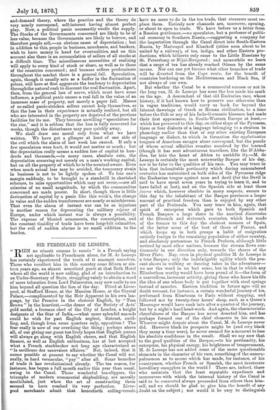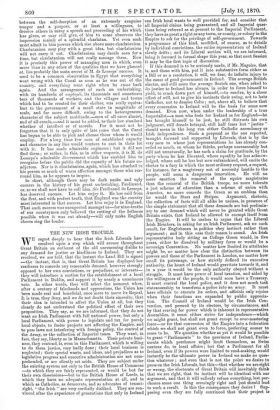SIR FERDINAND DE LESSEPS.
" RIEN ne r6ussit comme le succes " is a French saying not applicable to Frenchmen alone, for M. de Lesseps has certainly experienced the truth of it amongst ourselves. Those who recollect him in this country some fifteen or six- teen years ago, an almost unnoticed guest at that Bath Hotel where all the world is now calling, glad of an introduction to an Under-Secretary of State, struggling vainly to obtain a word of mere toleration from Lord Palmerston, may now smile to see him beyond all question the lion of the day. Feted at Liver- pool, at Stafford House, at the Mansion House, at the Crystal Palace,—complimented by the Heir Apparent in his own lan- guage, by the Premier in the choicest English, by " Tom Brown " in the heartiest,—the donee of the Society of Arts' gold medal, a freeman elect of the City of London, a knight designate of the Star of India,—what more splendid amends could he wish for past English neglect, distrust, cavil- ling, and, though from some quarters only, opposition ? The fear really is now of our overdoing the thing ; perhaps above all, of our giving our guest too lively hopes that English purses will always go along with English cheers, and that English finance, as well as English enthusiasm, has at last accepted what a French stockbroker not long ago characterized as "la meilleure des mauvaises affaires." Not, indeed, that it seems possible at present to say whether the Canal will not really, in hard vernacular, " pay " after all. Some branches of trade it has revolutionized already. The tea season, for instance, has begun a full month earlier this year than usual, owing to the Canal. Those wonderful tea-clippers, the triumphs of modern commercial shipbuilding, are morally annihilated, just when the art of constructing them seemed to have reached its very perfection. Liver- pool merchants admit that henceforth sailing-vessels
have no more to do in the tea trade, that steamers must re- place them. Entirely new channels are, moreover, opening, or about to open to trade. We have before us a letter from a Russian gentleman,—no speculator, but a professor of politi- cal economy in Southern Russia,—suggesting a company for the importation through the Canal direct into South-Eastern Russia, by Marioupol and Kharkoff (cities soon about to be united by a railway), of tea, indigo, and other Eastern pro- ductions, which hitherto only came to the Little Russians by St. Petersburg or Nijni-Novgorod ; and meanwhile we learn that a cargo of tea has already reached Odessa by the same means. Nor can one yet foresee what other branches of trade will be diverted from the Cape route, for the benefit of countries bordering on the Mediterranean and Black Sea, if not always of our own.
But whether the Canal be a commercial success or not in the long run, M. de Lesseps has none the less made his mark on the age. A descendant of that old Euskarian race, whose history, if it had known how to preserve one otherwise than in vague traditions, would carry us back far beyond the faintest dawnings of Greek or Roman civilization, to a time before the Celt or any of his Indo-Germanic kinsmen had made their first appearance, in South-Western Europe at least,— which has preserved to this day, on either slope of the Pyrenees, three or four dialects of a language belonging to a stratum in phonology earlier than that of any other existing European language or dialect, to which in formation the agglutinative tongues of American savages alone correspond, but the puzzle of whose actual affinities remains unsolved by the learned (though it has sent adventurous travellers, like the D'Abba- dies, far into the heart of Africa to unriddle it),—M. de Lesseps is certainly the most noteworthy Basque of his day, nor is he false to the qualities of his race. You may trace in him that indomitable pertinacity which during unnumbered centuries has maintained on both sides of the Pyrenean ridge the Euskarian tongue against man and devil (for the Devil is said to have spent seven years in trying to learn it, and to have failed at last), and on the Spanish side at least those fueros which, however obsolete in many respects, ensure to this day to the inhabitant of the Basque provinces a larger amount of practical freedom than is enjoyed by any other part of the Peninsula. You may trace in him, again, that spirit of enterprise which gave to both Spanish and French Basques a large share in the nautical discoveries of the fifteenth and sixteenth centuries, which has made of the former to this day the choicest seamen of Spain, of the latter some of the best of those of France, and which keeps up in both groups a habit of emigration entirely foreign to the remaining population of either country, and absolutely portentous to French Prefects, although little noticed by most other nations, because the stream flows con- tinuously in one direction only, towards the shores of the River Plate. Nay, even in physical qualities M. de Lesseps is a true Basque ; only the indefatigable agility which the pea- sant shows in walking or dancing takes in the adventurer— we use the word in no bad sense, but in that in which any Elizabethan worthy would have been proud of it---the form of a marvellous, incessant activity, giving those who know his life the idea of one whose body is put together with steel springs instead of muscles. Eastern tradition in future ages will no doubt recount, for instance, a certain wonderful journey of his, performed from Khartoum to Paris without stopping, and followed not by twenty-four hours' sleep, such as a Queen's Messenger would have sunk into after a quarter of the journey, but by a night's hard head-work. And again, the characteristic cheerfulness of the Basque has never deserted him, and has perhaps formed one of the chief elements in his success.
Whoever might despair about the Canal, M. de Lesseps never did. However black its prospects might be (and very black they many a time were), he never seemed for a moment to lose his absolute confidence in the result. Shall we say now that to the good qualities of the Basque,—to his pertinacity, his enterprise, his physical energy, his brightness of temperament,
M. de Lesseps has not added some of the more questionable
elements in the character of his race, something of the unscru- pulousness as to means which has made, for instance, of his countrymen, whether French or Spanish, the most inveterate hereditary smugglers in the world ? There are, indeed, those who maintain that the least reputable expedients and
manoeuvres with which the internal history of the Canal is said to be connected always proceeded from others than him- self, and we should be glad to give him the benefit of any doubt on the subject ; nor would it be easy to distinguish between the self-deception of an extremely sanguine temper and a purpose, or at least a willingness, to deceive others in many a speech and proceeding of his which has given, or may still give, of him to some observers the impression mainly of a splendid charlatan. Yet even such must admit in him powers which rise above mere charlatanism. Charlatanism may play with a great idea, but charlatanism will not carry it out. Charlatanism may dazzle men for a time, but charlatanism will not really manage them. Now it is precisely this power of managing men in which, even more than in any other of the qualities that we have glanced at, lies probably the main secret of M. de Lesseps' success. It used to be a common observation in Egypt that everything went wrong with the Canal as soon as he was out of the country, and everything went right when he came back again. And the management of such an undertaking, with its hundreds of employe's, its thousands and sometimes tens of thousands of workers, and the villages and towns which had to be created for their shelter, was really equiva- lent to the government of a small state in magnitude of scale, and far more difficult, owing to the heterogeneous character of the subject multitude,—men of all races almost, and of all creeds,—and it must be added, to their low standard whether of intellect or of morals. For it must not be forgotten that it is only quite of late years that the Canal has begun to be able to pick and choose those whom it would employ. For a long time few men of established capacity and character in any line would venture to cast in their lot with it. It has made admirable engineers ; but it did not find them ; or rather, in this, as in other respects, it is M. de Lesseps's admirable discernment which has enabled him to recognize before the public did the capacity of his future co- adjutors. Nor is it charlatanism, again, which has attached to his person so much of warm affection amongst those who sur- round him, as he appears to inspire.
In short, although there may be dark nooks and ugly corners in the history of his great undertaking, Ferdinand, or, as we shall now have to call him, Sir Ferdinand de Lesseps, has deserved success. Let him enjoy it. He has said from the first, and with perfect truth, that England was the country most interested in that success. Let him enjoy it in England. That such success was unexpected amongst us—for nine-tenths of our countrymen only believed the cutting of the Isthmus possible when it was cut already—will only make English cheers ring the louder.































 Previous page
Previous page